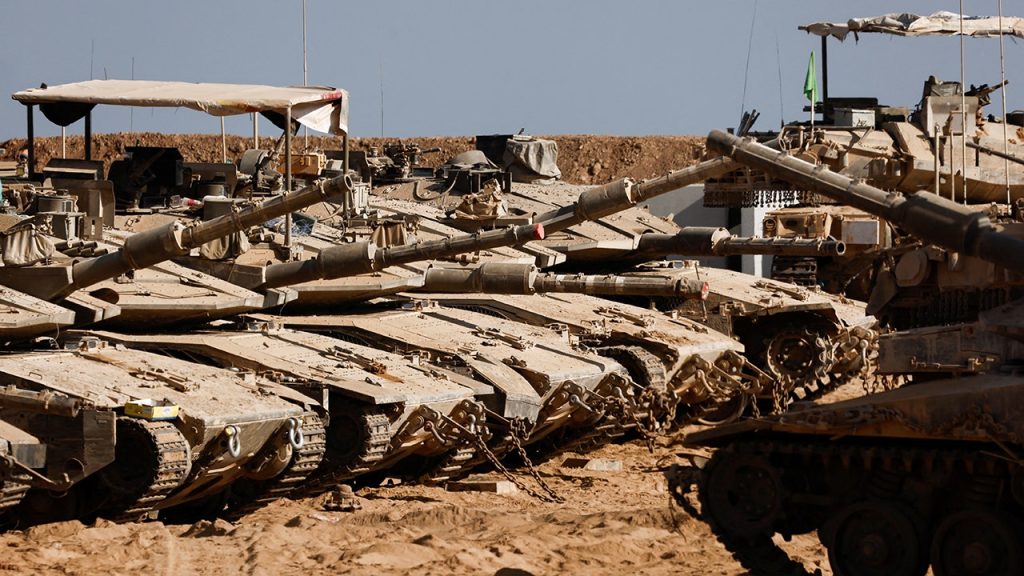In a tragic incident on Monday, five soldiers from the Israeli Defense Forces (IDF) lost their lives due to a roadside bomb in the Beit Hanoun region of northern Gaza. More than a dozen other service members were injured, prompting an immediate evacuation effort that faced additional gunfire from hostile forces. The incident occurs amidst ongoing diplomatic efforts, as Israeli Prime Minister Benjamin Netanyahu is currently in Washington, D.C., discussing a potential ceasefire with Hamas with U.S. officials.
| Article Subheadings |
|---|
| 1) Incident Overview |
| 2) Casualties and Injuries |
| 3) Context of the Attack |
| 4) Diplomatic Developments |
| 5) Broader Implications |
Incident Overview
The deadly incident occurred during a military operation in the Beit Hanoun area, involving the Northern Brigade of the IDF. Soldiers encountered explosive devices that were strategically placed to disrupt their ground operations. The explosion inflicted severe damage, highlighting the heightened risks military personnel face in this volatile region. Initially, the circumstances surrounding the incident were unclear, but officials confirmed the detonation of explosives endangered their troops.
Witnesses in the area reported hearing the explosion and subsequent gunfire as the IDF attempted to move injured soldiers to safety. The chaos of the attack and its immediate aftermath painted a grim picture of the dangers confronting Israeli forces within Gaza’s borders. This incident not only underscores the perilous environment but also reflects ongoing hostilities between Israeli forces and militant groups.
Casualties and Injuries
Among the five fallen soldiers were individuals identified as Staff Sgt. Meir Shimon Amar, Sgt. Moshe Nissim Frech, Sgt. 1st Class (res.) Benyamin Asulin, Staff Sgt. Noam Aharon Musgadian, and Staff Sgt. Moshe Shmuel Noll. Each soldier’s family has been notified, a process that brings heartbreak and dread to many households in Israel. These soldiers are remembered for their service and dedication to their country.
In addition to the fatalities, 14 other soldiers suffered injuries during the incident. Medical assessments revealed that two of those injured face severe medical conditions, while the remaining 12 experienced varying degrees of trauma that required hospitalization. The ongoing medical response reflects the complexities of sustaining military operations in areas rife with conflict, where medical support is often needed in high-stress environments.
Context of the Attack
This attack comes during a particularly tense time in the region, with various factions actively engaged in hostilities. The explosive device targeting IDF troops indicates a coordinated effort by armed groups to disrupt Israeli operations. Such tactics are part of a larger trend seen in conflicts where non-state actors utilize guerilla warfare strategies against regular military forces.
Although the specific group behind the attack was not mentioned in official reports, historical context suggests that groups operating within Gaza frequently employ similar tactics against IDF forces. The use of roadside bombs has become tragically effective and showcases a growing capability of these groups to challenge conventional military operations through asymmetric warfare.
Diplomatic Developments
Amid escalating violence, Israeli Prime Minister Benjamin Netanyahu is currently engaged in crucial discussions in Washington, D.C., aimed at addressing the ceasefire negotiations with Hamas. His meetings with U.S. government officials, including President Donald Trump, are significant stepping stones toward potentially reducing hostilities in the region.
Meanwhile, reports suggest that Hamas is actively working to derail U.S.-backed initiatives intended to bolster stability, further complicating the situation. Netanyahu’s urgent diplomatic efforts may be seen as a necessary response to recent escalations, including this bombing, as he seeks to find a common ground for a cessation of hostilities.
Broader Implications
The loss of IDF soldiers raises concerns regarding the overall safety and effectiveness of military operations in volatile regions. It brings to light the urgent need for strategic reassessment concerning troop deployments and military engagement rules in highly contested areas like Gaza. The increased risk to soldiers also puts pressure on military leadership to consider longer-term strategies and conflict resolution efforts.
Furthermore, the incident may influence public perception in Israel regarding the ongoing conflict and defense strategies against militant groups. As families mourn the loss of brave soldiers, the demand for accountability and effective strategies to ensure the safety of military personnel becomes paramount in the national conversation.
| No. | Key Points |
|---|---|
| 1 | Five IDF soldiers were killed in a roadside bomb attack in Gaza. |
| 2 | Fourteen additional soldiers were injured, with two reported in severe condition. |
| 3 | The explosive attack occurred during an IDF operation in Beit Hanoun. |
| 4 | Prime Minister Netanyahu is in Washington for ceasefire discussions with U.S. officials. |
| 5 | The incident reflects broader tensions and raises questions about military strategies in Gaza. |
Summary
The tragic events surrounding the roadside bomb attack reflect the challenging realities faced by Israeli military personnel in Gaza. With multiple casualties and diplomatic ramifications unfolding, the incident highlights the need for strategic reassessment, both on the battlefield and in diplomatic negotiations. As discussions regarding a ceasefire progress, the sacrifices made by these soldiers serve as a poignant reminder of the conflict’s human cost, urging advocates for peace to consider more sustainable solutions to end the violence.
Frequently Asked Questions
Question: What are the current Israeli military operations in Gaza focused on?
Currently, Israeli military operations in Gaza aim to neutralize threats from armed groups while ensuring the safety of soldiers. Recent actions include ground operations that are often met with resistance from militant factions.
Question: How does the Israeli government respond to attacks on its soldiers?
The Israeli government typically responds with immediate military action to retaliate against those responsible for attacks, alongside diplomatic efforts to engage with international partners for conflict resolution.
Question: What role do explosive devices play in the conflict?
Explosive devices are commonly used by armed groups as part of asymmetric warfare against conventional military forces, increasing the risks faced by military personnel and complicating operational strategies.


